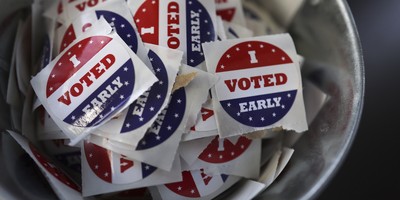Colleges and universities either prohibited by law from factoring race into admissions decisions, or those that prefer a subtler approach to admitting applicants based on race, do so by measuring personality, leadership qualities, life experiences, creativity, resilience, and other "noncognitive" factors.
According to a story in the Wall Street Journal, some schools claim that using noncognitive assessments are improving minorities' odds of admission. No kidding? Northeastern University in Boston has gone so far as to develop the Torch Scholars Program to assess "leadership potential" and evaluate how an applicant has "overcome adversity." As expected, average SAT scores for the program's so-called scholars are 200 points below the typical student.
Oregon State University requires applicants to answer a loaded question about facing or witnessing discrimination, a convenient way for the applicant to reveal his race.

The Educational Testing Service (ETS) has jumped on the bandwagon. The ETS, which administers the Graduate Record Examination, added a "personal potential index" for schools to consider in addition to standardized scores.
It's one thing if schools assessed these qualities in all applicants equally; it's quite another if schools give these qualities more weight when it comes to minority students. Why would having so-called leadership qualities, creativity, resilience, and a sparkling personality benefit minority applicants in particular? Wouldn't these traits be found in whites and Asians in equal or greater measure?
The answers are obvious, but let's pretend they're not. Consider the following:
In his highly recommended Human Accomplishment: The Pursuit of Excellence in the Arts and Sciences, 800 B.C. to 1950, Charles Murray compiled an inventory of 4,002 significant figures over 2,750 years who pursued excellence and accomplished great things in the arts and sciences. His inventory overwhelmingly consists of white European males, as do other authoritative and respected inventories.
Recommended
Murray made the case that no significant non-European figures and events had been omitted from the major inventories. What was known about great works of other cultures was included, and it was white Europeans who did the research and tried to preserve the records of those accomplishments, not non-European cultures.
In response to charges that European accomplishment in the sciences are exaggerated and that sources used to compile inventories are biased against non-European countries (about 97 percent of significant figures and events in the sciences are Western), Murray encouraged critics to augment the list of "giants" with non-Europeans, with one caveat: You must use the same rules by which European figures and events were included. He wrote:
"If the definition of 'significant event' or 'significant person' is relaxed to permit a dozen new non-European entries, hundreds of new entries will qualify for the European list, and the relative proportions assigned to Europe and non-Europe will not change. They may become more extreme, because the reservoir of non-trivial European accomplishment that did not get into the inventory is so immense."
In the same manner, colleges and universities that measure noncognitive qualities must apply the same rules to all applicants. If standards are relaxed to permit more minority admissions, more whites and Asians would qualify. If the relaxed standards increase only minority admissions, the noncognitive assessments are proxies for race, plain and simple.
"Colleges and universities should forget about race and ethnicity and focus simply on admitting the best students," said Roger Clegg, president and general counsel of the Center for Equal Opportunity. "That doesn't mean that they can't try to find diamonds in the rough, but those diamonds come in all colors."
Measuring noncognitive qualities is not objectionable per se. The intent behind the measuring can be objectionable. "If schools honestly believe that considering a particular factor will enable them better to select the best students," Clegg said, "then fine – but they should consider that factor for all students, and weigh it regardless of skin color or national origin. And if schools are considering a factor because they think it will result in more students of one color being chosen or fewer students of another color, then they are engaging in discrimination." <

























Join the conversation as a VIP Member